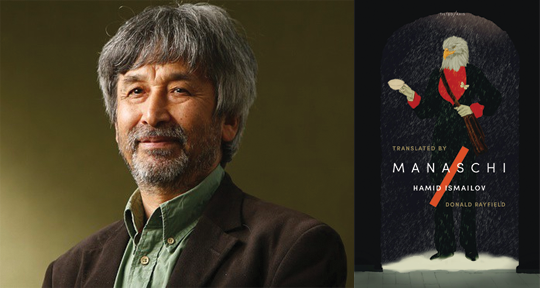Manaschi by Hamid Ismailov, translated from the Uzbek by Donald Rayfield, Tilted Axis, 2021
Despite being home to incredibly rich and ancient traditions of both spoken and written word, little of Central Asian literatures is known to English-language readers. Such is what is being spectacularly rectified in Hamid Ismailov’s latest novel to appear in English—Manaschi. The text, artfully translated from Uzbek to English by the meticulous Donald Rayfield, is an ode to the deeply rooted tradition of storytelling that crosses boundaries of ethnicity, gender, age, and time, taking truly epic proportions in Ismailov’s riveting prose.
A manaschi, in Kyrgyz tradition, is the person—usually a man, young or old—who performs the recitation of the epic poetry Manas, a body of narratives that contains up to 900,000 verses, and transmitted only orally before given a written form in the late nineteenth century. Reciting the Manas is an act of shamanism; it involves phenomenal memory, years of training, musical talent, and inspiration kin to a trance state. For some, the act even enables in the performer the ability to interpret dreams or foretell the future. Learning and performing the Manas embodies a lifetime’s dedication to one of the longest oral texts known to humanity, and the sacred practice prevails to this day, as new generations—now including women—continue to be trained.
The story takes place on the contemporary Kyrgyz-Tajik border in Chekbel, a mountainous village inhabited by mixed populations of nomadic Kyrgyz and sedentary Tajiks. Bekesh, the main character, is a radio journalist who lives in an urban part of Kyrgyzstan. Upon receiving the news that his uncle Baisal—a reputed manaschi—has died, he returns to his ancestral village to attend the funeral. This visit, initially conceived as a temporary break from his modern routine, turns into a life-changing experience, opening formidable questions regarding his familial and cultural duties, his unequivocal choices on identity, and his moral responsibilities to his call as a manaschi.

